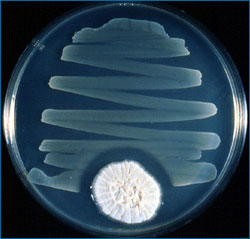You might not think of bacteria as particularly quick organisms, but in the arena of evolution, they are the epitome of speed. In fact, bacteria are adapting to our antibiotics much more quickly than we are developing new drugs! At the most basic level, the process of evolving resistance happens quickly in bacteria for two main reasons:
- They have large population sizes — any population is relatively likely to include an individual that happens to carry a gene for resistance.
- They have short generation times — a population in a patient can evolve from a susceptible state to a resistant one quickly.
However, other traits intensify this evolutionary race.
A few quirks in the biology and evolutionary history of bacteria accelerate the evolution of resistant strains even further. In animals and plants, gene copies are generally passed from parents to offspring — you can’t just walk up to a friend, give him your gene for type O blood, and expect him to start producing type O blood. But bacteria can actually do that sort of thing! In a process called horizontal gene transfer, bacteria can pass gene copies to one another directly, even to an entirely different species of bacteria! Horizontal gene transfer can kick the evolution of resistant bacteria strains into high gear because it means that, for example, a penicillin-susceptible pneumonia infection doesn’t necessarily have to wait around for a resistance mutation to randomly arise in order to start to evolve into a resistant strain. Instead, an individual in the population might be able to pick up a penicillin resistance gene from some other bacterium infecting the same patient.

Even worse, there are tons of ready-made resistance genes already floating around in free-living bacterial populations. Many antibiotics are chemicals that we found were being produced by soil-living fungi and bacteria for their own uses. After discovering these naturally occurring chemicals, researchers figured out how to mass-produce them and use them as drugs. But because these antibiotics have been around in nature for millions of years, soil bacteria have had millions of years to evolve genes for resistance to them. Carl calls this process “chemical warfare.” Many soil bacteria carry genes for resistance to various antibiotics, which they have then passed on, ready-made, to bacteria infecting humans through horizontal gene transfer. This all means that bacteria infecting humans have an edge on our antibiotics and that resistant strains can evolve quickly.

Learn more about chemical warfare and evolutionary arms races.

